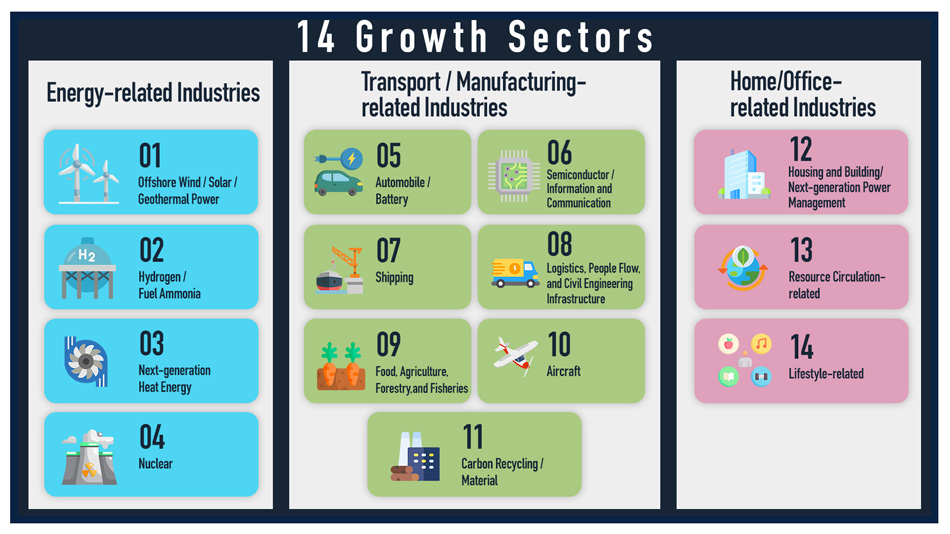May 2023
Reasons to Invest, or Launch a Business or Technology, in Japan
September 2022
As Japan expands innovation initiatives across all sectors of the economy in the country, its attractiveness as a destination for investment and global collaboration for foreign companies and investors is increasing. We will briefly consider three among several priority areas that are undergoing major transformation by the government:
- 1. the green sector
- 2. the digital sector
- 3. the business environment
All of these areas in Japan are being upgraded. Below, you will not only get a snapshot of the opportunities that are increasingly becoming available—for your products, services and technologies—but also gain insights into how Japan is more attractive than ever before as a place to live and thrive.

Japan is becoming a go-to destination for foreign direct investment (FDI) as well as innovation and collaboration between domestic and global partners.
The green sector in Japan received a shot in the arm when a green growth strategy was launched in December 2020. At the heart of that strategy—which covers at least 14 growth areas, including offshore wind, solar and geothermal power generation—is a goal to achieve net zero carbon emissions by 2050. This ambition will see the country becoming a magnet for decarbonization solutions from around the world.
To accelerate the development of green sector, two entities—the Ministry of Economy, Trade and Industry (METI) and the New Energy and Industrial Development Organization (NEDO)—launched the “Green Innovation Fund Project” in 2021.
The 2 trillion yen (about $15 billion) fund will enable research and development (R&D) and demonstration projects for products, services and technologies seeking to solve societal issues and, in many cases, help Japan achieve its decarbonization goals. It will also promote introducing cutting-edge technologies from overseas and international joint research and demonstration projects with expected ripple effects on the Japanese economy.
In addition to the Green Innovation Fund, further initiatives have been put in place to promote the transition to decarbonization and net zero, such as: tax incentives (via deductions and special depreciations); regulatory reform (via carbon pricing mechanisms, for instance); and human resources development (in universities, for example).

Japan has outlined 14 priority areas for which the Green Growth Strategy will seek to fund solutions
Importantly for foreign firms, investors and individuals, new collaborative platforms with Japan are being created, including technical collaboration agreements between Japan and other regions, mainly the United States, the European Union and Asia. In depth case studies in each area will be introduced in future articles, but an example in the green sector is briefly touched upon here.
Indeed, firms originating overseas are already taking advantage of Green Innovation Fund-led incentives—in addition to other government-led initiatives, such as renewable energy production-related tender procurement. Siemens AG, a German multinational corporation, is such an example.
In 2020, Siemens’ subsidiary, Siemens Energy K.K., and Toray Industries Inc., jointly applied for—and received funding from—a Green Innovation Fund-led project, namely the “Hydrogen Production Project by Water Electrolysis Using Electricity Derived from Renewable Energy and Other Sources.”
In the post-Covid-19 era, promotion of digitalization in the public and private sector has gathered pace in Japan. In September 2021, for instance, Japan’s Digital Agency was launched with a goal of accelerating adoption of digital technology across online government services and infrastructure, thus beginning the creation of a government-as-a-service platform.
The Digital Agency is tasked with ensuring public sector entities—from central to local government and others—are fit for purpose in the digital age. Importantly, the agency will seek inputs from the private sector to realize its goals, including from companies, technologies and individuals from abroad.
Digitalization in the public sector will make it smoother for all stakeholders to gain access to government services. Foreign-affiliated companies and individuals, for instance, will benefit from user-friendly online services when entering Japan, establishing a company, or complying with regulations, to name a few benefits.
In June 2022 a basic policy for the Vision was laid out for a “Digital Garden City Nation,” an initiative with an aim to achieve “rural-urban digital integration and transformation.” The vision has four priorities:
- 1. implementing digital services to solve rural issues
- 2. building a nationwide digital infrastructure
- 3. developing and securing human resources with digital skills
- 4. creating initiatives to leave no one behind
The “Digital Garden City Nation” initiative—which is relevant to a “Super City” program to enable the future city through digitalization—has many ambitions: Among them are achieving 5G coverage for 95 percent of the country by 2023, training 2.3 million tech savvy professionals by 2026, and increasing market reach for local SMEs by connecting them via digital tools to foreign businesses.
Such initiatives will have impacts across all industries and innovations fields, from finance (FinTech) to healthcare (HealthTech) to insurance (InsurTech) and regulations (RegTech). And they’ll not only utilize digital tools but also leverage concepts such as special economic zone designation to transform rural and urban areas.
Digitalization is one reason Pie Systems, founded in Denmark, chose to enter the Japan market. Launched in Scandinavia by two entrepreneurs who met in the United States, the company creates a smartphone application that simplifies tax free deductions for tourists. In their case, Japan’s tourism industry was ripe for digitalization due to the prevailing practice of using paper-based, in person processes to remit tax free offers.
What’s more, the digitalization drive has created an environment conducive to learning new digital skills across society. And indeed, firms launched by foreign entrepreneurs are already supporting the aim to train tech savvy professions: French-born LeWagon, for example, are foreign-led startups in Tokyo that train graduates, mid-career, and young professionals to become software developers.

Digitalization across government and society is one the aims of Japan’s newly-created digital agency.
Finally, creating a business environment that is conducive to innovation is also gaining pace in Japan. This includes promotion of R&D and innovation, securing manufacturing infrastructure and supply chains for strategic goods (semiconductors, oil, coal, natural gas are examples), and upgrading the country’s overall infrastructure.
At the same time, promotion of the startup ecosystem and next-generation industries such as artificial intelligence, quantum technologies, biotechnology, Web 3.0, blockchain, non-fungible tokens (NFTs), and the “metaverse” is underway.
It’s worth repeating that foreign firms and entrepreneurs—especially those with cutting-edge technologies and know-how as well as a collaborative mindset—will play a key role in realizing this strategy, as we will see in future articles. Suffice to note at this point is that, of particular interest to foreigners are initiatives being taken to improve their work and living environment so that they enjoy quality infrastructure and thrive in Japan.
Such measures make it easier than before to, establish and manage a company and navigate your day-to-day affairs in Japan.
Indeed, legacy challenges such as corporate governance (the Stewardship Code and Corporate Governance Code were established in 2014 and 2015, respectively), red tape, and the inheritance and corporate tax system are being revised to ensure firms and entrepreneurs from overseas can succeed in Japan. And that’s not to mention systems that support global families—such as access to national healthcare services, international schools, and a generally peaceful daily living environment.
But there is more being done, and more is to follow. For instance, Prime Minister Fumio Kishida, in an address delivered on a “new capitalism” in April 2022, made a commitment to funnel capital from the Government Pension Investment Fund, one of the world’s largest managers of public funds, towards startups. Founders of foreign companies, venture capitalists—and other investors and entrepreneurs—are set to benefit from such funding, especially in a sector that thrives on the ready availability of investable seed capital.
Learn More
Contact Us
Investing in and collaborating with Japan
We will do our very best to support your business expansion into and within Japan as well as business collaboration with Japanese companies. Please feel free to contact us via the form below for any inquiries.
Inquiry FormJETRO Worldwide
Our network covers over 50 countries worldwide. You can contact us at one of our local offices near you for consultation.
Worldwide Offices

































